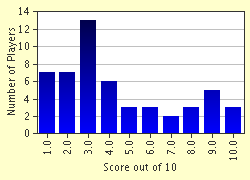Quiz Answer Key and Fun Facts
1. What Pre-Socratic philosopher "thought that our world was only one of a myriad of worlds that evolve and dissolve in something he called the boundless"?
2. According to this Greek philosopher, the human body is composed of three parts: the head, the chest, and the abdomen.
3. What 15th century central figure of the Renaissance exclaimed, "Know thyself, O divine lineage in mortal guise!"?
4. To this 17th century philosopher, "God did not create the world in order to stand outside it. He believed that God is the world and the world is in God." His work, "Ethics Geometrically Demonstrated", is perhaps his most important.
5. The leading rationalists of the seventeenth century included René Descartes, Baruch Spinoza, and which of the following?
6. What 18th century empiricist philosophized that "God is 'intimately present in our consciousness, causing to exist for us the profusion of ideas and perceptions that we are constantly subject to'?"
7. What historical philosopher from the 18th century had "great significance for the Romantics and believed that history is characterized by continuity, evolution, and design?"
8. Rules that can be applied to reflecting on a situation in which "a tension arises between two opposite ways of thinking but is then resolved by a proposal of a third thought which accommodates the best of both points of view" were termed dialectic process by which 19th century philosopher?
9. This 19th century philosopher believed that there were three different forms of life, which he called stages. He called them the aesthetic stage, ethical stage, and religious stage.
10. This 18th century French author "played a prominent role during the French Revolution by producing numerous brochures on social questions and several plays. She was beheaded in 1793 for daring to defend Louis XVI and oppose Robespierre."
Source: Author
airsammy51
This quiz was reviewed by FunTrivia editor
agony before going online.
Any errors found in FunTrivia content are routinely corrected through our feedback system.

